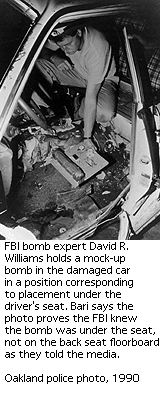Judi Bari Fights On Despite Worsening Illness
by Nicholas Wilson

Judi Bari Fights On Despite Worsening Illnessby Nicholas Wilson
|

|
|
With her health
declining rapidly from inoperable cancer, environmental leader Judi Bari continues working hard to clear her name as she receives round-the-clock home hospice care.
In a Monitor interview last week, she said she is reducing her dosage of morphine during daytime to work on her nearly six-year old lawsuit against the FBI and Oakland Police for allegedly framing her in the unsolved 1990 car bombing that almost took her life. The FBI's latest motion to dismiss her lawsuit is set for a hearing in Oakland Federal Court on Friday, February 28, at 10:30 am. Bari's attorney will make an aggressive countering motion including a summary of all the evidence gathered in the suit. Bari said she is no longer looking for a miracle cancer cure, but is putting her work in order and focusing on condensing and summarizing more than 13,000 pages of evidence.
| |
|
Due to continued
delaying tactics by defense lawyers and Bari's rapidly declining health, Bari is not likely to live until her suit eventually comes to trial. On her own initiative, Bari a few weeks ago testified at a deposition, answering questions under oath from her lawyer, Dennis Cunningham, as a court reporter took down every word for the record.
Bari said Sher coerced her into an agreement to keep the contents of her deposition secret from the media by threatening to delay the deposition for a month, a delay he knew she couldn't afford. As a result, Cunningham said, the substance of her testimony can't be released until it becomes part of the court record. Usually that would mean not until trial, he said, but there are ways in which at least some of the information may go into the record sooner. He estimated that the earliest the case could come to trial is September, "if everything went our way, and we won a series of tactical moves." As previously reported in the Monitor, Bari and fellow activist Darryl Cherney are suing the FBI and Oakland Police, charging that the law enforcement groups lied about the car bombing in order to frame them as terrorists. Their goal, Bari says, was to discredit and politically neutralize them and the Earth First! movement. Bari says she can prove in court that the FBI and OPD could see from the physical evidence that she was the target of the bombing and not its perpetrator, but intentionally smeared her and Earth First! by false statements to the media about the location of the bomb in her car, by failing to mention that the bomb was motion triggered, and by falsely claiming that nails taped to the bomb for shrapnel effect matched nails found in a search of her house.
| |
 |
One of three FBI agents recently ousted from the fabled FBI crime lab was Senior Special Agent David R. Williams, the top bomb expert who examined evidence in the Bari case, as well as the Oklahoma City Federal Building bombing and the New York World Trade Center bombing. FBI Director Louis Freeh reassigned Williams along with Roger Martz, chief of the chemistry unit at the crime lab, and James Thurman, chief of the explosives unit where Williams worked as the chief evidence gatherer, according to a story by Mike Geniella in the February 8 Santa Rosa Press Democrat. The three agents were disciplined after a Justice Department investigation alleged they had mishandled evidence, and in some instances misled the courts. It was Williams, according to the Oakland Police, who had told them that nails attached to the Oakland bomb matched nails found in a search of Bari's house "within a batch of 200 to 1000." This statement, widely reported in the media, persuaded many that Bari was indeed linked to making the bomb. But when Williams was questioned under oath by Bari and her lawyers in 1994, he denied making such a statement to the OPD. He testified there was no way to tell how many nails were made in a single batch, but it could be millions, and there was no way to link the bomb nails to the ones found in Bari's toolbox. He also admitted that two searches of Bari's house failed to turn up any evidence whatsoever linking her to the car bomb. Two months after the bombing the Alameda County District Attorney cited a lack of evidence in declining to file any charges against Bari or Cherney. But the two had been arrested and held under $100,000 bail because police claimed that they were dangerous terrorists and flight risks, even though Bari was in an intensive care unit, her pelvis broken in several places, and her right leg paralyzed. The bombing made headlines nationally, and the media relayed a series of FBI and Oakland Police statements claiming evidence that Bari and Cherney were terrorists injured when their own bomb exploded accidentally as they were on their way to plant it somewhere.
| |
|
An Associated Press story by Michael Sniffen in the February 10 Santa Rosa Press Democrat was headlined "Freeh tries to polish FBI's image amid rising criticism," and subheaded "Bureau staggers from snafus." The story said, "The FBI is still taking massive hits for its bungled conduct of the Atlanta Olympic bombing investigation. Even its fabled crime laboratory's reputation has been sullied, tarnishing respect created over the decades on radio and television, and in scores of movies." The article quotes FBI Deputy Director Weldon Kennedy as saying, "The single thing most responsible for the success of the FBI" is that "people are confident that if they come to the FBI, the matter will be handled professionally and well. If that trust ever breaks down, not only is the FBI in trouble, but the American people are in trouble." Asked for comment on that quote, Bari said, "Then I guess we're all in trouble, because the FBI has been a fraud from the beginning. Its true purpose has been to suppress political dissent. It started with the Wobbly (International Workers of the World) raids in the teens, when it was still called the Bureau of Investigation. There has been a constant use of its forces to suppress political dissidents on the left. Have people forgotten COINTELPRO? Have we forgotten what they did to the Black Panthers and the American Indian Movement? This was the basis on which this organization was founded and continues, from the mind of a maniac, J. Edgar Hoover. And it continues without him. "The reputation of the FBI was built up through movies and television, but it wasn't built up because of its true actions," Bari continued. "All that was a propaganda ploy designed by Hoover to improve the FBI's image, because it's been doing such reprehensible work. They can get all the writers and TV shows they want but it won't change who they are or what they do. If they really were what they pretend to be they wouldn't need PR flacks to polish their image." Asked who she thinks was responsible for the bombing, Bari said, "I don't know. I don't want to falsely accuse someone the way I was falsely accused. I think it was a hit, not a lone individual. I think it was definitely a cabal of some kind. I don't think the FBI directly bombed me, because that is not their history. But they certainly may have had prior knowledge." Attorney Cunningham is hopeful that there will be new attention to Bari's case due to the evidence which will be revealed in the new motion. He says "that will jump the attention and the interest and the understanding of what happened to her by several orders of magnitude." He feels that heightened public interest in the case combined with other recent chinks in the armor of the FBI's legendary reputation will make it possible to call for a special prosecutor to investigate FBI wrongdoing. "That would get it out of the bog of this case and get it into the flow of the current stuff that's happening with the FBI," Cunningham concluded. |
Albion Monitor February 25, 1997 (http://www.monitor.net/monitor)
All Rights Reserved.
Contact rights@monitor.net for permission to reproduce.
